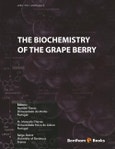The Biochemistry of the Grape Berry is a pioneer offering for readers - giving a focused and integrated coverage of the key biochemical and molecular aspects of grape berry development and ripening. Readers will benefit from a comprehensive and updated coverage on key steps, mechanisms and regulation in grapevine biochemistry and molecular biology, provided by an international team of leading scientists. It provides useful references on this research area and original data from laboratories worldwide. The comprehensive range of topics covered in this e-book is valuable to a multidisciplinary readership including plant physiologists, enologists, microbiologists, wine makers, biochemists and students. Thus The Biochemistry of the Grape Berry represents a step forward in the comprehension of grape berry biochemistry, wine quality and health benefits.
Table of Contents
ForewordPreface
List of Contributors
Acknowledgements
1. Water Relations of the Grape Berry and Aquaporins
S. D. Tyerman, M. M. Chaves and F. Barrieu
2. Mineral Compounds in the Grape Berry
V. Martins, A. Cunha, H. Gerós, M. Hanana and E. Blumwald
3. Source/Sink Relationships and Molecular Biology of Sugar Accumulation in Grape Berries
C. Davies, P. K. Boss, H. Gerós, F. Lecourieux and S. Delrot
4. The Biochemistry of Organic Acids in the Grape
C. M. Ford
5. Phenolics in Grape Berry and Key Antioxidants
S. D. Castellarin, L. Bavaresco, L. Falginella, M. I. V. Z. Gonçalves and G. Di Gaspero
6. Aroma and Aroma Precursors in Grape Berry
P. Darriet, C. Thibon and D. Dubourdieu
7. Polyamines and Grape Berry Development
M. N. Panagiotis, and A. Aziz R. -A. A. Kalliopi
8. Grape Cell Vacuoles: Structure-Function and Solute Transport Across the Tonoplast
N. Fontes, S. Delrot and H. Gerós
9. Tackling the Cell Wall of the Grape Berry
L. F. Goulao, J. C. Fernandes, P. Lopes and S. Amâncio
10. Hormonal Control of Grape Berry Development and Ripening
C. Böttcher and C. Davies
11. Transcriptomics and Metabolomics for the Analysis of Grape Berry Development
G. B. Tornielli, A. Zamboni, S. Zenoni, M. Delledonne and M. Pezzotti
12. The Microbial Community of Grape Berry
V. Loureiro, M. M. Ferreira, S. Monteiro and R. B. Ferreira
13. Wine and Health
P. -L. Teissedre
Index








